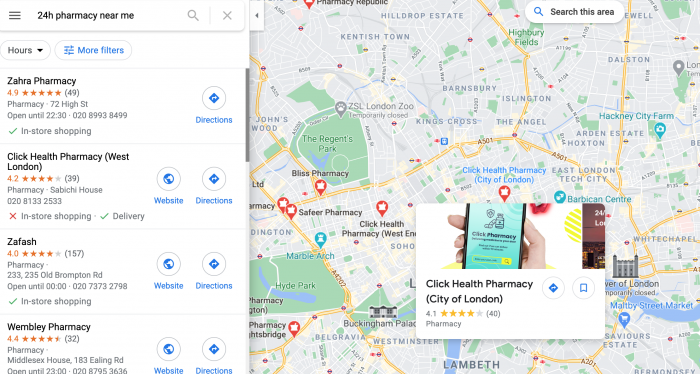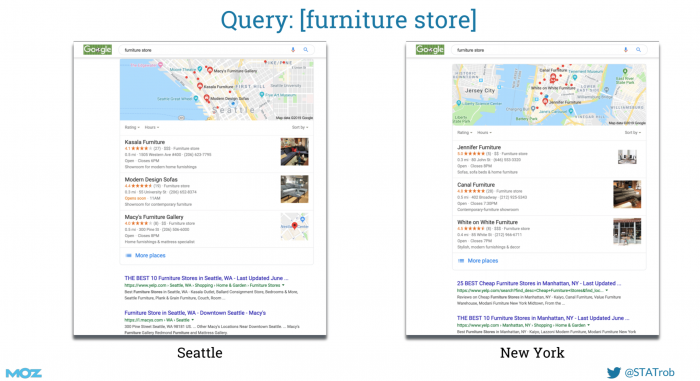As we are emerging from Covid-19 lockdown, with the UK’s economy slowly opening up all sectors, the marketing landscape presents a mix of opportunities and challenges. With a significant amount of shops disappearing from the high streets, the established and the newcomers are not only competing against each other to win market share in their local area, but also struggling with the business disruptions caused by the success of online delivery companies, such as Amazon.
Did you know that 97% of consumers search on Google to discover a local business? Google is the homepage for all local businesses, and only by taking over as much real estate on Google SERP as you can, you would manage to establish your authority in your industry, build brand awareness and expand your customer base in today’s demanding marketing climate.
Whether or not your business was immune to the lockdown regulations, focusing on improving your local SEO strategy is what makes the difference between business gain and business loss. In this article, we are discussing key aspects of search engine optimisation on local markets:
- How local search works on Google
- Why is local SEO important for local businesses
- What is the difference between national, regional, and local SEO
- How to adapt your marketing strategy to boost visibility in local search
Why does local search visibility matter for businesses with a fixed location?
Img source: Google Maps
Ever wondered what your competition is doing that seems to be working out so well, while your phone is not ringing and your shop’s doorbell is silent throughout the day? Why your store is empty, and your website is not performing? Well, let’s ask a different kind of question: how do you rank in local search on Google?
Now let’s ask your target audience’s questions: Are there any emergency plumbing services available now?, Are there any 24h pharmacies open near me?, Are there any local hairdressers?, Where can I order food delivery tonight?, I wonder if the market is open on Sunday, What time does my favourite restaurant close on Friday?, Are there any home depot stores nearby?, etc.
Local search visibility is vital for service-area businesses, boutiques, local shops, and brick-and-mortar stores across all industries. It plays a crucial role in creating brand awareness and driving more business, and it is what makes the difference between an empty and a busy store, a striving and a prosperous business.
What are the benefits of local SEO?
You want your potential customers to know of your existence, to easily find out what your opening hours are, to contact you with a simple click of a button, to get directions to your store, to order online and pop into your shop when they need your services, instead of reaching out to your competitors.
The higher the visibility in local search, the greater the benefits: from driving more footsteps to your location and acquiring new customers, or getting more enquires and building authority in the industry, to improving website traffic and boosting sales.
Regardless of how you choose to look at it, creating an online presence and working towards improving your shop’s visibility in local search is what you should be focusing on if you want your local business to thrive in 2021 and beyond.
Understanding the local intent of a search query. How local search works?
Google adapts the search engine results pages depending on the location of the searcher. So a Google search on the exact same query performed from two different locations will generate different results – the greater the distance between search locations, the bigger the difference between the SERPs.
Based on the query that users type in the search bar, Google aims to display the content that is the most relevant to the search to meet the user’s intent – and the location where the search is performed from is part of that intent.
When searching for service providers, most often then not, people are looking to discover businesses within their proximity. Let’s take an example. If you are searching for SEO services, the location may or may not be as important or relevant for you as it is if you were to search for plumbing services.
So if you type in Google “plumbing services” without adding a location-related keyword to your query, but you are located in London, the SERP will list the websites of plumbing service providers that are top ranking for the phrase and that are London-based, within your proximity.
By comparison, if you are performing a search and you add a geo-modifier that is different from where you are located, (e.g. if you are located in London, but look for “SEO specialist in NY”), then Google will prioritise the location mentioned within the query above the location of the searcher and shape the SERP accordingly, so it displays the webpages that best rank for the exact phrase.
This shows that Google is taking location as a signal that shapes how the search results would look like, which is why optimising for local search and targeting location-related keywords make a huge difference for businesses with a fixed location, improving their visibility in local search.
Global, national, regional, local SEO. What’s the difference?
Img Source: MozCon 2019
The main difference between global, national, regional and local SEO boils down to the keywords that are being used when performing a search. For example, “plumbing services”, “plumbing services UK”, “plumbing services London”, “plumbing services Hammersmith”.
While it is intuitive that big multinational companies will rank higher on broader, more competitive phrases, it is not as intuitive for local businesses to rank on more granular keyword phrases without the added effort of optimising for local search.
A study pointed out that there is no such thing as a national search engines results pages for many of the searches performed nowadays on Google, with 73% of the 1.2 million search engine results pages analysed having localised features on them.
This shows that most of the time we are performing a local search, even if we don’t realise we are doing so. We rarely are aware of the fact that the SERP displayed after a performed search looks the way it does because of our location, even if we use broad terms or queries without a geo-modifier.
How should you adapt your SEO strategy to rank in local search?
Which markets should you prioritise, which queries should you use to optimise your website’s content, what impact will you local SEO have on your business’ performance, how does it differ from your national strategy? Should you focus your resources on optimising Google My Business page, your website, or both? How should you build brand awareness in your area? These are all valid questions that every business owner should address to plan a suitable marketing strategy.
Here are a few pointers to get you started:
1. Adopt a comprehensive marketing approach
Focusing on one side of the story you risk missing out on some opportunities. Some businesses are only doing Google My Business management, while others are working on their website optimisation, run geo-targeting campaigns or local link building.
If you want to boost your visibility in local search, rank on featured snippets, appear in Google Local 3 pack and get as much real-estate in Google’s SERP as possible, then you have to work on all fronts at the same time.
2. Optimise Google My Business
Regularly update your Google My Business profile and make sure you provide the necessary information for your customers to make it easier for them to get in contact with you. Make sure you choose the categories that best describe your business, and add specific attributes to help your business stand out. Have you claimed your business on Google my Business? Read this GMB guide to get started.
If you are a service area business and your GMB is not showing up in any organic search results, you have to start optimising your website to rank in the organic search. Working on on-page optimisation is going to help you GMB ranking, too.
3. Optimise your website for long-tail keywords and queries containing geo-modifiers
Run a keyword research to discover what queries your target audience uses to find businesses like yours. Use keyword variations based on location from country, city, and borough, depending on the area your business operates.
Not only that the same search query performed from two different markets would get different SERPs, but the differences can be significant across the same market on a search performed from a different postal code. So how can you know what keywords you should be using to rank in local search?
In some cases it might make sense to consider keywords that are bound to your location down to the postal codes, while in other cases it might be redundant. For example, it makes sense to optimise for “plumbing services in W6”, but not for “SEO services in W6”. In this case it would make more sense to optimise for “SEO services in West London”.
The more rivals you have in your area, the more granular you have to get in optimising for local intent to make sure you are competitive in local search. Last but not least, aim to post content on your website that answers the questions people usually ask in Google, either on your blog section, or service pages.
Need an expert opinion? Contact our digital marketing team to get help in boosting your website’s traffic.
4. Build brand awareness through local citations and link-building
Build your brand awareness in your area by signing up for local business directories and resources, such as Yell. Make sure your NAP details are correct, and that you are using the best website directories for your area.
Create a content marketing calendar and pitch your articles to the local press to gain more references and drive more website traffic. To earn quality links, you need to write high quality content and have an outreach strategy in place. You might want to outsource this to a link-building agency if you want to get quality coverage in press to build your reputation, improve your local search visibility, and boost your site traffic.
5. Run Google ads geo-targeting and local PPC campaigns
Run local PPC campaigns to target your potential customers in your local area. It is a fantastic way to get brand recognition and drive more footsteps to your physical store. Your potential customers will see your ad when they are in your proximity, exactly when they need your services the most. Plus, a local PPC campaign is resource-friendly, as you get to control as much as you want to spend.
Ask a Google Ads management agency to assist you in planning your strategy, setting up your goals, and running your campaign to make sure you attain your business objectives.
6. Get reviews and feedback from your customers
Last but not least, try to get as much feedback as can from your customers. This will help you build trust and establish credibility in your industry, increasing the visibility of your business in local search.
As people are more inclined to buy from a website that has customer reviews, you can see it as a great way to attract more customers and help them make an informed decision when considering your services, which will help you increase your conversion rates.
Need a hand to boost your local search visibility? Our SEO specialists can help with your local search engine optimisation. Contact us today and open your doors to new business opportunities in your local area.






